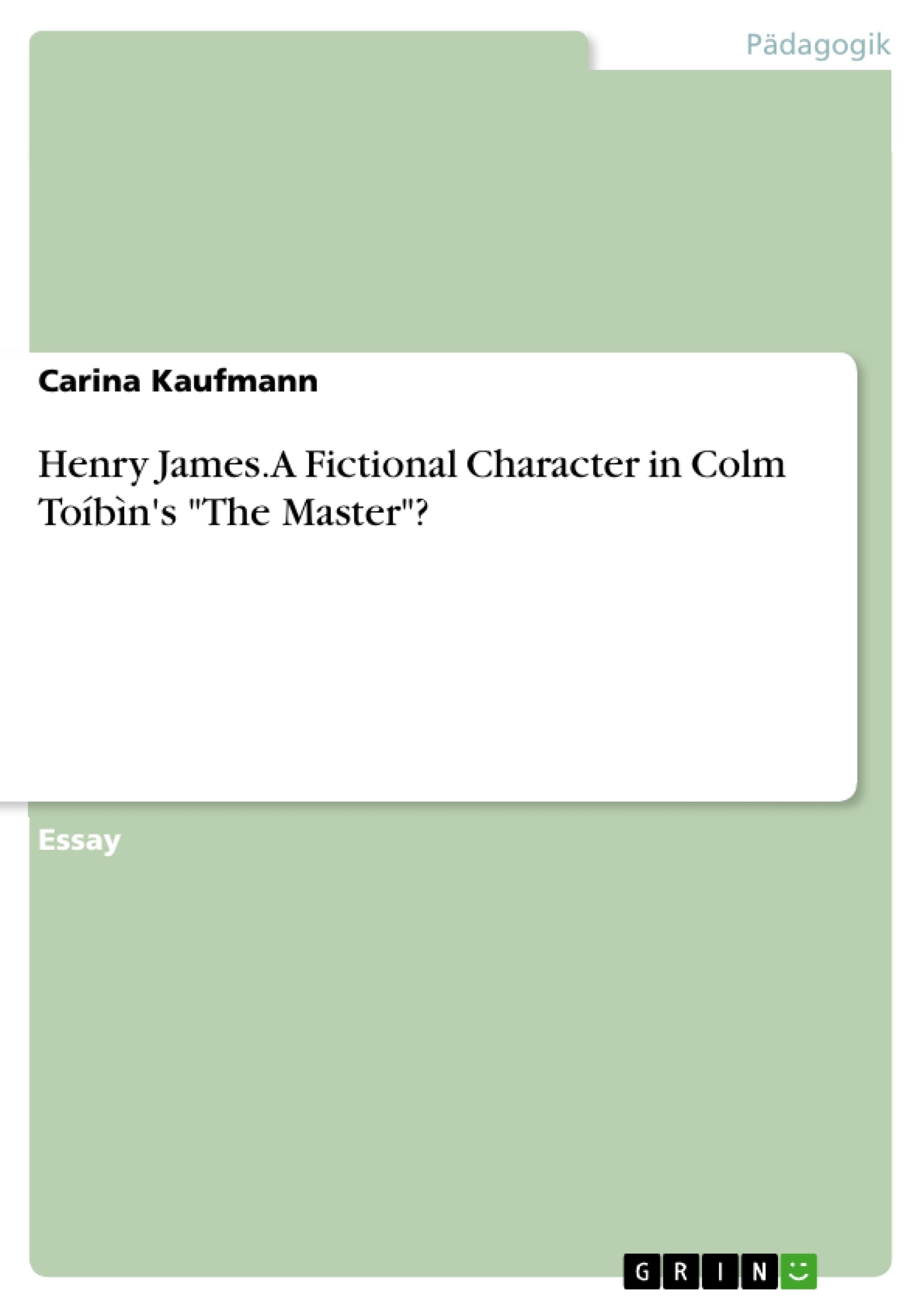Henry James is one of the most important writers and a key-figure of 19th-century literary realism. To deal with Henry James and his works also means to appreciate him as a figure of literary interest. That is to say that he increasingly became not only the issue of reviews or literary criticism but a literary character in a number of novels as well. The numerous biographies and stories about Henry James emphasize his importance but also raise the question of truth and reliability in texts of this genre.
The Irish writer Colm Tóibín deals with Henry James in his novel "The Master" and queues into the diversity of literary works about Henry James. To understand the ambiguity of James as a person of literary interest, this essay tries to focus on the characteristics that shape the view of Henry James. Furthermore, it aims to investigate the question whether Colm Tóibín creates a fictional Henry James who appeals to “somebody who’s never read a word of James and knows nothing to him“.
Starting with the definition of relevant terms, this essay proceeds with the description of the contemporary interest in Henry James. Furthermore, it examines Colm Tóibín’s narrative techniques in order to characterize James and questions to what extent these techniques contribute to the fictionality of his work. After exploring the usage of intertextuality, this essay mentions the effects for the two readerships that The Master addresses. It concludes in saying that for though Colm Tóibín does not invent a fictitious character, his Henry James remains a variant of the real Henry James.
Inhaltsverzeichnis
- Definition relevanter Begriffe
- Das zeitgenössische Interesse an Henry James
- Colm Tóibíns narrative Techniken
- Intertextualität
- Die Wirkung von The Master auf die Leserschaft
Zielsetzung und Themenschwerpunkte
Diese Abhandlung untersucht die Frage, inwieweit Colm Tóibín in seinem Roman "The Master" eine fiktive Version von Henry James erschafft. Sie analysiert die charakteristischen Merkmale, die die Wahrnehmung von Henry James prägen, und untersucht, ob Tóibín einen fiktiven James kreiert, der "jemandem, der noch nie ein Wort von James gelesen hat und nichts von ihm weiß"¹ anspricht.
- Die Definition von Fiktion und Fiktionalität
- Die Darstellung von Henry James als literarische Figur
- Die Verwendung narrativer Techniken in "The Master"
- Die Rolle der Intertextualität
- Die Auswirkungen von "The Master" auf verschiedene Leserschaften
Zusammenfassung der Kapitel
- Das erste Kapitel beschäftigt sich mit der Definition relevanter Begriffe wie Fiktion, Fiktionalität, Biographie und biographischer Roman. Es wird die Unterscheidung zwischen diesen Genres beleuchtet, um die Komplexität der Beziehung zwischen literarischen Texten und der realen Welt zu verdeutlichen.
- Das zweite Kapitel untersucht das zeitgenössische Interesse an Henry James. Es werden die Gründe für die Faszination an seiner Person und seinen Werken beleuchtet, darunter die Rätselhaftigkeit seines Lebens, seine vielschichtigen Beziehungen und seine Rolle als Vorbild für andere Schriftsteller.
- Das dritte Kapitel analysiert Colm Tóibíns narrative Techniken in "The Master". Es werden die Mittel untersucht, die Tóibín einsetzt, um James als Figur zu charakterisieren, insbesondere die Verwendung von Rückblenden, die Darstellung von James als stiller Beobachter und die Andeutungen auf seine Sexualität.
- Das vierte Kapitel befasst sich mit der Rolle der Intertextualität in "The Master". Es wird gezeigt, wie Tóibín die Werke von James selbst in seinen Roman integriert und wie dies die Fiktionalität des Textes beeinflusst.
Schlüsselwörter
Die zentralen Themen und Begriffe in dieser Abhandlung sind: Henry James, Colm Tóibín, "The Master", Fiktion, Fiktionalität, Biographie, biographischer Roman, literarische Figur, narrative Techniken, Intertextualität, Leserschaft, Sexualität, Ambivalenz, Geheimnis.
Häufig gestellte Fragen
Worum geht es in Colm Tóibíns Roman „The Master“?
Der Roman thematisiert das Leben des berühmten Schriftstellers Henry James und stellt ihn als literarische Figur dar.
Ist der Henry James im Roman eine rein fiktive Figur?
Die Arbeit untersucht, inwieweit Tóibín eine fiktive Version erschafft. Obwohl er keine völlig neue Figur erfindet, bleibt sein Henry James eine literarische Variante des realen Vorbilds.
Welche narrativen Techniken nutzt Colm Tóibín?
Tóibín verwendet Rückblenden, stellt James als stillen Beobachter dar und arbeitet mit Andeutungen auf dessen Sexualität und vielschichtige Beziehungen.
Was bedeutet Intertextualität in diesem Kontext?
Tóibín integriert Werke und Zitate von Henry James selbst in seinen Roman, was die Grenze zwischen Fiktion und Realität (Biografie) verschwimmen lässt.
An wen richtet sich der Roman laut der Analyse?
Die Arbeit analysiert die Wirkung auf zwei Leserschaften: Kenner der Werke von James und Leser, die bisher keinerlei Vorwissen über ihn hatten.
- Quote paper
- Carina Kaufmann (Author), 2015, Henry James. A Fictional Character in Colm Toíbìn's "The Master"?, Munich, GRIN Verlag, https://www.grin.com/document/303873



